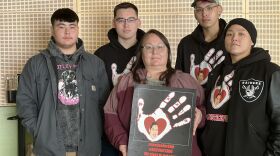During its 2023 annual convention, the Alaska Federation of Natives (AFN) broke from its normal format to include a lengthy knowledge sharing session that focused on the impacts of climate change on food security. Many long-time leaders called on younger generations to get involved in these difficult conversations, and young people who were there listened.
For nearly four hours, delegates representing Alaska’s twelve regions stepped up to a microphone to speak on their priorities and voice deep concerns about food security and what it means for cultural identity.
“Subsistence is also food sovereignty and self determination,” said Karen Plentnikoff, the community environment and safety manager at Aleutian Pribilof Islands Association, Inc. “To feed ourselves and our families, giving us purpose and empowerment. Subsistence is access to food that protects our health and celebrates what is what it is to be Unangax,” she said.
For decades, Roy Aschenfelter served on at least half a dozen different regional and local wildlife committees in an effort to preserve the Alaska Native subsistence lifestyle for the Bering Straits region. "It’s time for some new voices on long-lived food security challenges," he said.
“I would try to ask young people to step to the floor and join those different committees, because I don't believe they're going away,” Aschenfelter said. “We still need voices to deal with the game issues. We still need voices to deal with the fishery issues that are currently in play.”
In his 30’s, Jonathan Samuelson is following Aschenfelter’s lead as the chair of the Kuskokwim River Inter-Tribal Fish Commission.
“We are the stewards of the spawning grounds of fish that feed the world. Yet for far too long we have been the last to eat,” Samuelson told a crowd of hundreds.
His organization represents 33 tribes that aim to co-manage salmon in the Kuskokwim River. He said that’s becoming increasingly difficult.
“There are children on the Yukon who have never seen a fish,” Samuelson said. “We are adaptive people, but what fails to be adaptive is policy. It has stayed stagnant. And out of that necessity, the tribes of the Kuskokwim River have held their feet to the fire.”
Some of the kids who live in the Yukon-Kuskokwim Delta were sitting in the audience, and they know the fisheries issue well.
“Yeah, sometimes it can be a [real] struggle when the fishing season closes,” said 18-year old Hooper Bay resident Nathan Fisher. “I want to see that you can go fishing any day.”
Fisher was among dozens of students who listened intently during the knowledge sharing session.
Isaiah Stewart,16, from Bethel was also there.
“I heard people advocating,” Stewart said.“They were saying they don’t like the word subsistence and they were advocating for their way of life.”
Stewart said that it’s his way of life too, and that the testimony motivated him to speak up.
“I would have said a lot of the same things. I would have said that Alaskans are some of the strongest people in the world, and I believe that our story is very important,” Stewart said.
Audrey Cleveland said that she could also relate to what she heard, but the 16-year-old from Quinhagak also said that there was something missing.
“I heard a lot about the salmon and herring, but what I did not hear was mentioning of permafrost melting. And there’s a lot of communities that are dealing with the permafrost situation, and currently in our village we are trying to find solutions and trying to keep our buildings up and right,” Cleveland said.
Cleveland said that hearing the call from older generations to step up wasn’t lost on her.
"Because if this is for future generations and for [those] to come and after us, we have to do something now so that they can live on and so that they won't have the problems as much,” Cleveland said. “Some voices aren’t heard as much, and take every opportunity you have because every voice matters.”
That idea, that all voices matter, has come up over and over again at AFN. At previous conventions, delegates have criticized the organization for not allowing enough time to acknowledge everyone who has something to say.
This year AFN added two knowledge sharing sessions to make space for more voices. And while many of the younger people who attended didn’t step up to the microphone, they were still part of the conversation.






